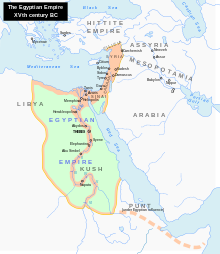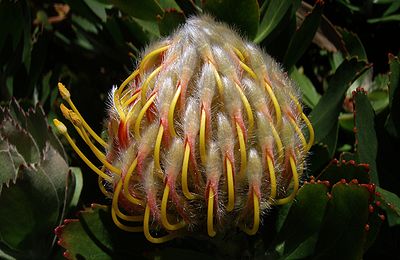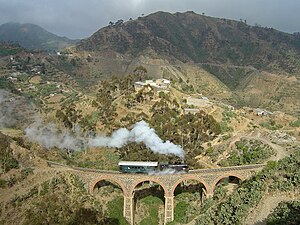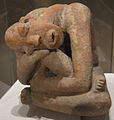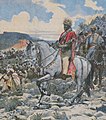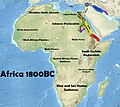Portal:Africa



Africa is the world's second largest and second-most populous continent after Asia. At about 30.3 million km2 (11.7 million square miles) including adjacent islands, it covers 20% of Earth's land area and 6% of its total surface area. With 1.4 billion people0 as of 2021, it accounts for about 18% of the world's human population. Africa's population is the youngest amongst all the continents; the median age in 2012 was 19.7, when the worldwide median age was 30.4. Despite a wide range of natural resources, Africa is the least wealthy continent per capita and second-least wealthy by total wealth, ahead of Oceania. Scholars have attributed this to different factors including geography, climate, lack of democracy, tribalism, corruption, colonialism, the Cold War, and neocolonialism. Despite this low concentration of wealth, recent economic expansion and the large and young population make Africa an important economic market in the broader global context.
Africa straddles the equator and the prime meridian. It is the only continent to stretch from the northern temperate to the southern temperate zones. The majority of the continent and its countries are in the Northern Hemisphere, with a substantial portion and a number of countries in the Southern Hemisphere. Most of the continent lies in the tropics, except for a large part of Western Sahara, Algeria, Libya and Egypt, the northern tip of Mauritania, and the entire territories of Morocco, Ceuta, Melilla, and Tunisia which in turn are located above the tropic of Cancer, in the northern temperate zone. In the other extreme of the continent, southern Namibia, southern Botswana, great parts of South Africa, the entire territories of Lesotho and Eswatini and the southern tips of Mozambique and Madagascar are located below the tropic of Capricorn, in the southern temperate zone.
Africa is highly biodiverse; it is the continent with the largest number of megafauna species, as it was least affected by the extinction of the Pleistocene megafauna. However, Africa also is heavily affected by a wide range of environmental issues, including desertification, deforestation, water scarcity and pollution. These entrenched environmental concerns are expected to worsen as climate change impacts Africa. The UN Intergovernmental Panel on Climate Change has identified Africa as the continent most vulnerable to climate change.
The history of Africa is long, complex, and varied, and has often been under-appreciated by the global historical community. Africa, particularly Eastern Africa, is widely accepted as the place of origin of humans and the Hominidae clade (great apes). The earliest hominids and their ancestors have been dated to around 7 million years ago, including Sahelanthropus tchadensis, Australopithecus africanus, A. afarensis, Homo erectus, H. habilis and H. ergaster—the earliest Homo sapiens (modern human) remains, found in Ethiopia, South Africa, and Morocco, date to circa 233,000, 259,000, and 300,000 years ago, respectively, and Homo sapiens is believed to have originated in Africa around 350,000–260,000 years ago. Africa is also considered by anthropologists to be the most genetically diverse continent as a result of being the longest inhabited. (Full article...)
Selected article –
Featured pictures –
Did you know (auto-generated) -

- ... that after erecting the African Union headquarters, the Chinese government was accused in 2018 of spying on the building for five years?
- ... that Alisha Kramer worked to fight HIV/AIDS, tuberculosis, and inequity in women's health in Africa and Europe as a program coordinator for the Center for Strategic and International Studies?
- ... that Agri-Expo is the oldest agricultural society in Africa?
- ... that Carver Court in Coatesville, Pennsylvania, was built to house African-American steelworkers during World War II?
- ... that when the sheriff in Helena, Arkansas, was asked to arrest Owen Flemming, an African-American man accused of killing a white overseer on June 8, 1927, he allegedly said "I'm busy. Just go ahead and lynch him"?
- ... that in the 1880s Joseph T. Wilson wrote the "most comprehensive study of African American military service" of the era?
Categories
Selected biography –
Évariste Leon Kimba Mutombo (16 July 1926 – 2 June 1966) was a Congolese journalist and politician who served as Foreign Minister of the State of Katanga from 1960 to 1963 and Prime Minister of the Democratic Republic of the Congo from 13 October to 25 November 1965. Kimba was born in 1926 in Katanga Province, Belgian Congo. Following the completion of his studies he worked as a journalist and became editor-in-chief of the Essor du Congo. In 1958 he and a group of Katangese concerned about domination of their province by people from the neighbouring Kasaï region founded the Confédération des associations tribales du Katanga (CONAKAT), a regionalist political party. In 1960 the Congo became independent and shortly thereafter Moise Tshombe declared the secession of the State of Katanga. Kimba played an active role in the separatist state's government as its Minister of Foreign Affairs and participated in numerous talks with the central government aimed at political reconciliation. Following the collapse of the secession in early 1963, Kimba had a falling out with Tshombe and took up several ministerial posts in the new province of South Katanga.
Tshombe was later made Prime Minister of the Congo while Kimba joined the Association Générale des Baluba du Katanga (BALUBAKAT) party. On 13 October 1965 President Joseph Kasa-Vubu dismissed Tshombe and appointed Kimba Prime Minister. Kimba formed a government of national unity and spent the following weeks attempting to achieve rapprochement between the Congo and other African states. However, his government failed to obtain a vote of confidence from Parliament, though Kasa-Vubu reappointed Kimba to the premiership in the face of determined opposition from Tshombe's supporters. On 25 November Army Commander-in-Chief Joseph-Désiré Mobutu launched a coup removing both him and Kasa-Vubu from power and assumed control of the presidency. In May 1966 Mobutu's government accused Kimba of plotting with three other former government ministers to launch a coup. He was executed on 2 June for treason. (Full article...)Selected country –
 |
 |
||

| |||
Eswatini (/ˌɛswɑːˈtiːni/ ESS-wah-TEE-nee; Swazi: eSwatini [ɛswáˈtʼiːni]), officially the Kingdom of Eswatini (Swazi: Umbuso weSwatini), sometimes written in English as eSwatini, and formerly and still commonly known in English as Swaziland (/ˈswɑːzilænd/ SWAH-zee-land; officially renamed in 2018), is a landlocked country in Southern Africa. It is bordered by Mozambique to its northeast and South Africa to its north, west, and south. At no more than 200 kilometres (120 mi) north to south and 130 kilometres (81 mi) east to west, Eswatini is one of the smallest countries in Africa; despite this, its climate and topography are diverse, ranging from a cool and mountainous highveld to a hot and dry lowveld.
The population is composed primarily of ethnic Swazis. The prevalent language is Swazi (siSwati in native form). The Swazis established their kingdom in the mid-18th century under the leadership of Ngwane III. The country and the Swazi take their names from Mswati II, the 19th-century king under whose rule Swazi territory was expanded and unified; the present boundaries were drawn up in 1881 in the midst of the Scramble for Africa. After the Second Boer War, the kingdom, under the name of Swaziland, was a British protectorate from 1903 until it regained its independence on 6 September 1968. In April 2018, the official name was changed from the Kingdom of Swaziland to the Kingdom of Eswatini, mirroring the name commonly used in Swazi.
Selected city –
Pretoria (/prɪˈtɔːriə, pri-/prih-TOR-ee-ə, pree-; Afrikaans: [prəˈtʊəria] ), also known as Tshwane, is South Africa's administrative capital, serving as the seat of the executive branch of government, and as the host to all foreign embassies to South Africa.
Pretoria straddles the Apies River and extends eastward into the foothills of the Magaliesberg mountains. It has a reputation as an academic city and center of research, being home to the Tshwane University of Technology (TUT), the University of Pretoria (UP), the University of South Africa (UNISA), the Council for Scientific and Industrial Research (CSIR), and the Human Sciences Research Council. It also hosts the National Research Foundation and the South African Bureau of Standards. Pretoria was one of the host cities of the 2010 FIFA World Cup. (Full article...)In the news
- 12 February 2024 –
- Two boats collide on the Congo River near Kinshasa, Democratic Republic of the Congo; with the death toll remains unclear. (AP)
- 11 February 2024 – 2023 Africa Cup of Nations
- In association football, hosts Ivory Coast win their third Africa Cup of Nations by defeating Nigeria 2–1 in the final. Sébastien Haller scores the winning goal in the 81st minute. (The Guardian)
- 10 February 2024 – Somali civil war
- Four Emirati soldiers and a Bahraini military officer are killed, while ten other people are injured, when a soldier opens fire at a military base in Mogadishu, Somalia, before being killed in the ensuing shootout. Al-Shabaab claims responsibility. (AP)
- 10 February 2024 –
- A Eurocopter EC130 helicopter crashes near Nipton, California, United States, killing all the six people on board, including Nigerian banker Herbert Wigwe. (CBS News)
- 10 February 2024 – 2023–2024 Senegalese protests
- Violent protests occur in Senegal following an announcement by President Macky Sall that presidential elections have been delayed from February 25 to December 15. (Sky News)
- 9 February 2024 –
- At least 18 people are killed during a collision between a bus and a truck on a road in Kinshasa, Democratic Republic of the Congo. (AP)
Updated: 16:33, 14 February 2024
General images -
Africa topics
More did you know –

- ...that the 1459 Fra Mauro map (pictured) reports that "a junk from India" rounded the Cape of Good Hope in 1420, around 70 years before the navigations of Vasco da Gama?
- ...that the 1998 Sudan famine was caused by human rights abuses in the midst of the Second Sudanese Civil War?
- ...that a smokie is a West African delicacy made by blowtorching the carcass of a sheep or goat without removing its fleece?
- ...that Anne-Marie Nzié, a Cameroonian bikutsi singer, dedicated the song Liberté to President Paul Biya and his party, the Cameroon People's Democratic Movement?
Related portals
Major Religions in Africa
North Africa
West Africa
Central Africa
East Africa
Southern Africa
Associated Wikimedia
The following Wikimedia Foundation sister projects provide more on this subject:
-
Commons
Free media repository -
Wikibooks
Free textbooks and manuals -
Wikidata
Free knowledge base -
Wikinews
Free-content news -
Wikiquote
Collection of quotations -
Wikisource
Free-content library -
Wikispecies
Directory of species -
Wikiversity
Free learning tools -
Wikivoyage
Free travel guide -
Wiktionary
Dictionary and thesaurus

